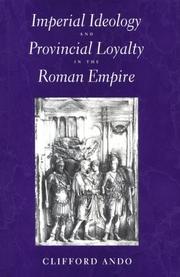| Listing 1 - 2 of 2 |
Sort by
|
Book
ISBN: 9780520248953 0520248953 0520287592 0520943147 1283331837 9786613331830 9780520943148 9780520287594 Year: 2011 Publisher: Berkeley: University of California press,
Abstract | Keywords | Export | Availability | Bookmark
 Loading...
Loading...Choose an application
- Reference Manager
- EndNote
- RefWorks (Direct export to RefWorks)
The infamous emperor Caligula ruled Rome from A.D. 37 to 41 as a tyrant who ultimately became a monster. An exceptionally smart and cruelly witty man, Caligula made his contemporaries worship him as a god. He drank pearls dissolved in vinegar and ate food covered in gold leaf. He forced men and women of high rank to have sex with him, turned part of his palace into a brothel, and committed incest with his sisters. He wanted to make his horse a consul. Torture and executions were the order of the day. Both modern and ancient interpretations have concluded from this alleged evidence that Caligula was insane. But was he? This biography tells a different story of the well-known emperor. In a deft account written for a general audience, Aloys Winterling opens a new perspective on the man and his times. Basing Caligula on a thorough new assessment of the ancient sources, he sets the emperor's story into the context of the political system and the changing relations between the senate and the emperor during Caligula's time and finds a new rationality explaining his notorious brutality.
Emperors --- Caligula, --- Rome --- History --- Gaius Caesar Germanicus, --- Gaius, --- Gaius, Julius Caesar Germanicus, --- Caligola, --- Ḳaligulah, --- קאליגולאה, --- קאליגולא, --- קאליגולה --- Kaligula, --- Biography --- Emperors - Rome - Biography --- Caligula, - Emperor of Rome, - 12-41 --- Rome - History - Caligula, 37-41 --- ancient history. --- ancient rome. --- ancient sources. --- biography. --- brutality. --- caligula. --- career. --- classical period. --- dark. --- dramatic. --- engaging. --- famous tyrant. --- general audience. --- historical analysis. --- history buffs. --- history. --- human cruelty. --- intense. --- mental illness. --- military. --- nobility. --- nonfiction. --- notorious figures. --- political science. --- political system. --- political thriller. --- politics. --- questioned sanity. --- revolt. --- roman emperors. --- roman politics. --- roman senate. --- rome. --- torture. --- tyrant. --- world history. --- worship.

ISBN: 0520220676 9780520220676 0520280164 0520923723 1597346721 Year: 2000 Volume: 6 Publisher: Berkeley (Calif.): University of California press,
Abstract | Keywords | Export | Availability | Bookmark
 Loading...
Loading...Choose an application
- Reference Manager
- EndNote
- RefWorks (Direct export to RefWorks)
The Roman empire remains unique. Although Rome claimed to rule the world, it did not. Rather, its uniqueness stems from the culture it created and the loyalty it inspired across an area that stretched from the Tyne to the Euphrates. Moreover, the empire created this culture with a bureaucracy smaller than that of a typical late-twentieth-century research university. In approaching this problem, Clifford Ando does not ask the ever-fashionable question, Why did the Roman empire fall? Rather, he asks, Why did the empire last so long? Imperial Ideology and Provincial Loyalty in the Roman Empire argues that the longevity of the empire rested not on Roman military power but on a gradually realized consensus that Roman rule was justified. This consensus was itself the product of a complex conversation between the central government and its far-flung peripheries. Ando investigates the mechanisms that sustained this conversation, explores its contribution to the legitimation of Roman power, and reveals as its product the provincial absorption of the forms and content of Roman political and legal discourse. Throughout, his sophisticated and subtle reading is informed by current thinking on social formation by theorists such as Max Weber, Jürgen Habermas, and Pierre Bourdieu.
Allegiance --- -Political stability --- -Destabilization (Political science) --- Political instability --- Stability, Political --- Loyalty, Political --- Political loyalty --- Rome --- Cultural policy --- -Influence. --- History --- Provinces --- -Administration. --- Political stability --- Roman provinces --- Administration. --- Influence. --- Allégeance --- Stabilité politique --- Politics and government --- Administration --- Politique et gouvernement --- Histoire --- State governments --- Destabilization (Political science) --- Consensus (Social sciences) --- Legitimacy of governments --- Loyalty --- Citizenship --- Patriotism --- Rim --- Roman Empire --- Roman Republic (510-30 B.C.) --- Romi (Empire) --- Byzantine Empire --- Rome (Italy) --- Allegiance - Rome. --- Political stability - Rome. --- Influence --- administration. --- allegiance. --- ancient rome. --- ancient world. --- augustus. --- body politic. --- bourdieu. --- bureaucracy. --- central government. --- christian ideology. --- empire. --- fall of the empire. --- government. --- habermas. --- history. --- imperial identity. --- max weber. --- nonfiction. --- political consensus. --- political stability. --- politics. --- power struggle. --- power. --- provinces. --- provincial loyalty. --- revolt. --- roman emperors. --- roman empire. --- roman government. --- roman history. --- roman military. --- roman senate. --- rome. --- social formation.
| Listing 1 - 2 of 2 |
Sort by
|

 Search
Search Feedback
Feedback About UniCat
About UniCat  Help
Help News
News